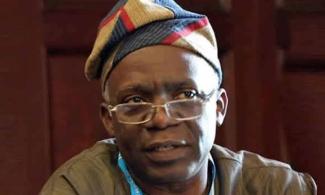
The Chief of Army Staff, Lt. Gen. Faruk Yahaya, recently ordered all commanders to identify vulnerable locations in their jurisdictions and take full control of such areas ahead of the general elections.
The Alliance on Surviving Covid-19 and Beyond (ASCAB) has urged President Muhammadu Buhari to keep the armed forces away from Nigeria’s electoral process.
A statement issued on Friday and signed by the Chairman of ASCAB, Femi Falana (SAN), made reference to various times the court kicked against the deployment of soldiers to supervise elections in the country.
The Chief of Army Staff, Lt. Gen. Faruk Yahaya, recently ordered all commanders to identify vulnerable locations in their jurisdictions and take full control of such areas ahead of the general elections.
Meanwhile, military vehicles and movements of its personnel have been sighted in Ogun, Borno, Lagos and the Federal Capital Territory in what is believed to be a show of force ahead of the polls.
However, Falana noted that it is on record that “members of the Nigerian armed forces were indicted by the courts for their involvement in the rigging of the 2003 general election”.
He said, “In condemning the anti-democratic role of the military deployed by President Obasanjo to prosecute his "do or die" agenda, the Court of Appeal held in Buhari v Obasanjo (2005) 1 WRN 1 at 200 that "in spite of the non-tolerant nature and behaviour of our political class in this country, we should by all means try to keep armed personnel of whatever status or nature from being part and parcel of our election process.
“The civilian authorities should be left to conduct and carry out fully the electoral processes at all levels."
ASCAB also recalled that the Supreme Court (Per Pats-Acholonu JSC) said in Buhari vs. Obasanjo (2005) 50 WRN 1 at 133 that "...in this day and age in this country that has been independent for 45 years we can still witness horrendous acts by security officers who ought to dutifully ensure peace and tranquility in the election process, suddenly turning themselves into agents of destruction, and introduced mayhem to what ordinarily would have been a civilized way of exercising franchise by the people who are sovereign, is regrettable."
He noted that the Court of Appeal warned the armed forces to keep away from the electoral process “in Yussuf v Obasanjo (2005) 18 NWLR (PT 956) 96,” saying, "It is up to the police to protect our nascent democracy and not the military, otherwise democracy might be wittingly or unwittingly militarised.
“This is not what the citizenry bargained for in wrestling power from the military in 1999. Conscious step or steps should be taken to civilianise the polity to ensure the survival and sustenance of democracy."
In the same vein, ASCAB noted that in Femi Gbajabiamila v The President (Suit No FHC/L/CS/1210/15), Justice Ibrahim Buba, in his ruling, declared that it is “unconstitutional to deploy military for the supervision of election without the approval of the National Assembly”.
“Consequently, the Court restrained the President Goodluck Jonathan-led Federal Government from deploying the military to supervise the coming general elections,” the group said.
During the Ekiti State governorship election in June 2014, some military officers were indicted for manipulating the electoral process.
The group noted that the National Human Rights Commission probed the electoral crimes and confirmed that members of the armed forces were hired by “criminally minded politicians to rig the 2015 elections”.
Following the investigation conducted by the army headquarters into the rigging of the governorship election, some military officers were indicted and retired, ASCAB said.
It was also noted that following an election petition filed by the All Progressives Congress against the Peoples Democratic Party, the Court of Appeal stated that the “President lacked the power to call on the Armed Forces to restore law and order in any part of the federation without the approval of the National Assembly as provided in sections 217(2) and 218(4) of the Constitution as amended”.
In conclusion, ASCAB said, President Buhari should not allow the armed forces to be involved in the conduct of the election.
The group said, “Instead of terrorising voters, armed soldiers should be confined to their barracks and put on the alert.
“Since the Federal Government has restricted the movement of people throughout the country, the police, anti-graft agencies and para-military forces should be deployed by the Inspector-General of Police to maintain law and order during the 2023 General Election.
“President Buhari should be reminded of the cautionary words of the Court of Appeal in Yussuf v Obasanjo (supra) that "it is up to the police to protect our nascent democracy and not the military, otherwise democracy might be wittingly or unwittingly militarised. This is not what the citizenry bargained for in wrestling power from the military in 1999.’"